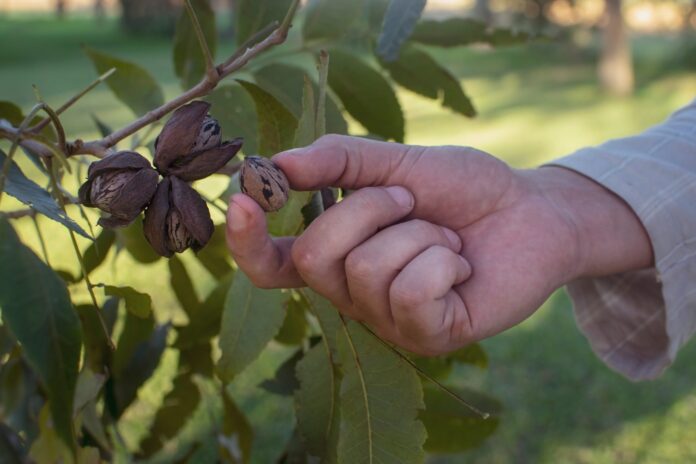AUBURN UNIVERSITY, Ala. – Why aren’t my pecan trees bearing anymore? This is a common question many people ask during the fall, especially if they have older trees in their yard or landscape. The following information outlines some common factors that can affect a pecan tree’s production.
Bearing in alternate years
Pecan trees–like most other nut or fruit producing trees–have a natural tendency to bear in alternate years. In nature this is called masting, which is a way for trees to overwhelm the birds and animals that eat their fruit or nuts. This is needed so that some of the seeds will be left to produce seedlings so the species can survive. Scientists have wrestled with this problem for years, and while some remedies have been developed, it is still a problem for commercial pecan farmers. This is one reason that most orchards contain more than one variety.
Diseases and insects
Pecans are susceptible to a range of diseases. The biggest limiting factor for pecan producers in the Southeast is a disease called pecan scab. This disease attacks the foliage, nut shucks, and even young stem tissue. Most older varieties are susceptible to scab including popular varieties such as Stuart and Mahan.
Over time, a resistant variety may become susceptible to pecan scab because the fungus changes over time. Stuart was once resistant to pecan scab but began to show symptoms in the 1960s. A lot of people may remember picking up bucket after bucket of these pecans and now don’t understand why they can’t still do that. Pecan scab is the one most likely reason.
Insects also affect pecan yields. Pecan phylloxera has been a serious problem in many parts of Alabama for a long time. Pecan weevils also attack pecans. Beginning in late summer, pecan weevils emerge from the soil and crawl or fly into the tree and begin feeding on the developing nuts. When a weevil pierces a nut shuck to feed, the nut aborts in a day or two. Pecan weevils lay eggs in the nuts, and the larvae eat all the inside of the nut and chew a neat, round hole in the shell to escape and fall to the ground. The weevils then remain in the soil for two to three years. This is a good example of a pest adapting to the alternate bearing habit.
Control options
The only way to control insects and diseases is to spray the entire tree. Few homeowners have the necessary equipment to spray mature trees. Also, unfortunately, there are few homeowner options for controlling insects. So, what can you do? The best advice is to plant pecan-scab-resistant varieties and fertilize, lime, and water your trees. Scab resistant varieties include Elliott, Avalon, Kanza, Lakota, Gafford and Amling. A nursery list is available at your county’s Extension office.
Soil
Soil fertility and moisture are always factors that affect bearing in pecans. If you have not taken a soil sample for testing, do so and apply the recommended rates of lime and fertilizer. For more information on soil testing, read the Alabama Extension publications Home Soil Testing: Taking a Sample and Home Soil Testing: Using The Soil Test Report available at www.aces.edu. Your county’s Extension office can provide the soil sample boxes and can help interpret your soil test results if needed.





















